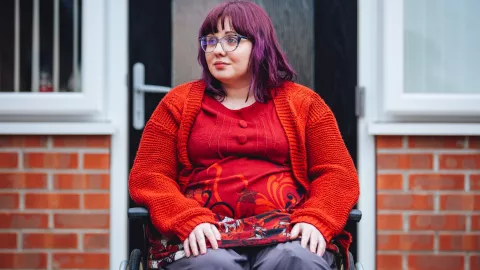
Finding perspective and hope helps me cope with anxiety
I was diagnosed with Generalised Anxiety Disorder when I was 19, before I was diagnosed with MS, and it’s been going on ever since. I have learned to manage it a lot better now through Cognitive Behavioural Therapy (CBT).
I was diagnosed with Generalised Anxiety Disorder when I was 19, before I was diagnosed with MS, and it’s been going on ever since. I've learned to manage it a lot better now through Cognitive Behavioural Therapy (CBT).
One of the big things after I was diagnosed with MS was the anxiety of what was going to come next and how it was going to affect me – the uncertainty. I had some bad spells that meant I had to have time off work. I’d started feeling like I couldn’t do my job even though I was getting good feedback.
After that my main anxiety was whether I would be able to continue to walk and to work. I did put myself under quite a lot of pressure, which didn’t help matters, to keep working. And at the same pace, too – I did a lot of overtime back then.
Because I was aware there were so many different avenues my MS could take, the uncertainty didn’t help, and I didn’t always know what to do. It may have even worsened my symptoms.
Sticking to the things that work
I now use guided meditations on YouTube, and it’s just about putting skills into practice from my CBT. So if I’m getting overwhelmed around how much I have to do, I schedule time in for those things. But I also schedule time in to do something that I enjoy, or to just have a rest so as not to burn myself out.
It’s harder to keep this in practice when I do get overwhelmed. But if I do, I sit and try to calm myself down. I’ve had panic attacks in the past when I’ve not quite known what got on top of me, but then when I’ve talked about it, I’ve worked out what caused me to feel that way. So I would get heart palpitations and get upset easily and not know why.
I can’t hide it when I’m upset anymore either because my spasms give it away. I can put a brave face on, but if I’m not feeling great, my MS symptoms get worse. So it’s not always as easy to take time to gather my thoughts.
Importance of pacing yourself
To others going through anything like this I would say: pace yourself, take time out just to reassess the situation. Sometimes with anxiety we can get caught up in a feedback loop of negativity. Sitting there in that doesn’t always help. Being able to detach yourself from the moment and see it from a different perspective can help calm you down.
I also have a really good support network with family and friends, and my carers. I’m a lot more open these days about what I’m going through. I would have kept it to myself before until I was at breaking point. Then it would be obvious because I would end up beside myself.
Speak to someone
When my anxiety was at my worst I did have thoughts of suicide. I think if you have this, you need to talk to someone about it. Sometimes speaking with someone impartial or a helpline can be easier because you can feel less judged. I would suggest Mind or the MS Helpline. I was using Mind for quite a while, I went to the social quiz quite regularly – it was a chance for some banter and joking.
I got involved with my local MS group in 2019 which really helped. There were so many different people, and with different experiences and at different stages of their MS. I avoided groups before because I thought I would just see how much worse it could get. It showed me there is a community.
I became a volunteer group coordinator in July 2021. It helped give me something to focus on and restored some structure into my days. I had started to feel lost with being unable to work. I realised my self-worth was based on the jobs I’d had, but volunteering helped me realise that there is much more to life than paid employment.
When you find people that understand it – either from living with the condition or caring for someone that lives with it – it can solidify that feeling of hope.
If you're affected by any of the issues raised in Sabrina’s story, our MS Helpline can give you emotional support. Call 0808 800 8000 or email [email protected]. We’re here Monday to Friday, 9am to 7pm except bank holidays.
You can also can call Samaritans 24 hours a day from any phone, on 116 123




